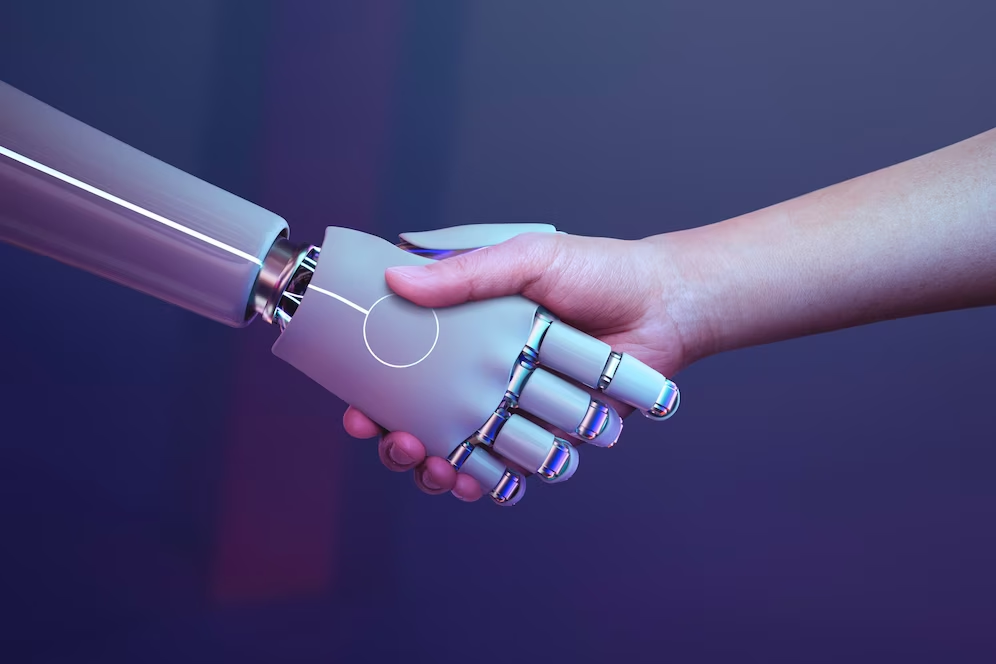One of the unintended consequences of the recent technological innovations we have been conjuring up is a newfound increase in employee concern over job security. Nowadays, a whopping 37% of workers are worried about losing their jobs to the relentless march of automation and Artificial Intelligence (AI).
However, rather than being our replacements, should we not be considering these technologies as our allies, designed to streamline our lives and supercharge our productivity?
Instead of fearing the rise of the machines in the seemingly Terminator-esque fashion that the media likes to propagate, you could argue that we should be quietly optimistic about how AI and automation can propel us on a journey toward a more efficient, more productive future. After all, humans are irreplaceable, aren't they?
The Unmistakable Human Touch in a Data-Driven World
AI and automation, despite their sophistication, cannot replicate the unique human qualities of empathy, creativity, and problem-solving. These technologies are tools that can augment our capabilities, but they cannot replace the human touch.
They are designed to handle tasks that are repetitive and time-consuming, freeing up humans to focus on tasks that require a higher level of cognitive function and emotional intelligence.
For example, AI can be harnessed for the purpose of employee training, wherein course outlines, content, and quizzes can be drafted in a fraction of the time typically taken for such tasks. However, the review and approval of the training material would still be undertaken by subject matter experts to ensure the course’s relevance and accuracy.
The human element is what brings color to the black-and-white world of data and algorithms. It's the human touch that adds depth to the flat landscape of numbers and figures. It's the human spirit that breathes life into the cold, mechanical world of technology. And it's this human element that will always be indispensable, no matter how advanced our technologies become.
The Power of Synergy: Extracting Maximum Value from Data
It's no secret that data is the foundation of any successful organization. It's what fuels our decision-making processes, guides our strategies, and drives our growth. But without the right tools to harness its power, data can be overwhelming.
No matter how highly paid data analysts are, there is simply too much information for them to get through unassisted. That's where AI and automation come in. These are the tools that help us tame the data beast, turning raw data into actionable insights.
When used correctly, these tools help us to understand what data is available, where it resides within the organization, who has access to it, and can identify any gaps that may limit its effectiveness. Without it, companies are at a significant competitive advantage.
One area where this synergy comes to the forefront is in the HR department. Consider, for example, the use of AI and automation in resume screening, which can significantly cut down on the time HR professionals spend on this repetitive task.
By automating the initial screening process, HR personnel are then freed up to focus on the more nuanced aspects of hiring, such as face-to-face interviews and candidate evaluations that rely heavily on human judgment and intuition. Moreover, the integration of customized HR dashboard examples into HR operations can provide real-time insights into key performance indicators, streamline tasks, and improve strategic decision-making.
Likewise, automation in customer service, particularly through the use of chatbots, has allowed organizations to provide immediate responses to customer queries around the clock. However, while a chatbot can help troubleshoot simple issues, it's the empathetic understanding of a human that can truly assuage a frustrated customer's concerns.
The New Work Order: Job Evolution in the AI Era
You may be reading this and seeing all of the benefits that AI will bring in terms of efficiency and productivity and be wondering how this will not equate to catastrophic job losses across various sectors.
While it is true that AI and automation technologies will inevitably reshape the nature of many jobs, this does not necessarily mean they will replace them. In fact, these advanced tools may instead serve as catalysts for the creation of new and more engaging roles, transforming the work landscape rather than devastating it.
Let's delve into the world of data science as an example. This domain, barely known a decade ago, has skyrocketed to prominence with the rise of 'big data.' Data scientists are now in high demand, as they harness AI and automation tools to refine, analyze, and draw meaningful insights from vast datasets.
While AI can handle the computational aspects, it lacks the human touch --- the creativity and critical thinking that data scientists use to spot patterns, make connections, and suggest actionable strategies based on their findings.
This paradigm shift is not limited to data science. The manufacturing sector, transformed by industrial automation, now boasts new roles such as automation engineers and robotic process automation (RPA) specialists.
These roles focus on the design, implementation, and maintenance of automated systems. Though AI and automation execute routine tasks, human oversight remains crucial to managing the process, troubleshooting issues, and making system improvements over time.
Living in Harmony
Artificial intelligence and automation aren't threatening to replace humans; instead, they're reshaping our roles, allowing us to concentrate on tasks that demand critical thinking, creativity, problem-solving, and emotional understanding.
As we navigate this transition, it becomes crucial for businesses and educational institutions to prepare their workforce for the future. This preparation should include fostering technical skills to leverage AI and automation tools, alongside the cultivation of uniquely human soft skills like creativity, problem-solving, and emotional intelligence.
Comments
Loading comments…
